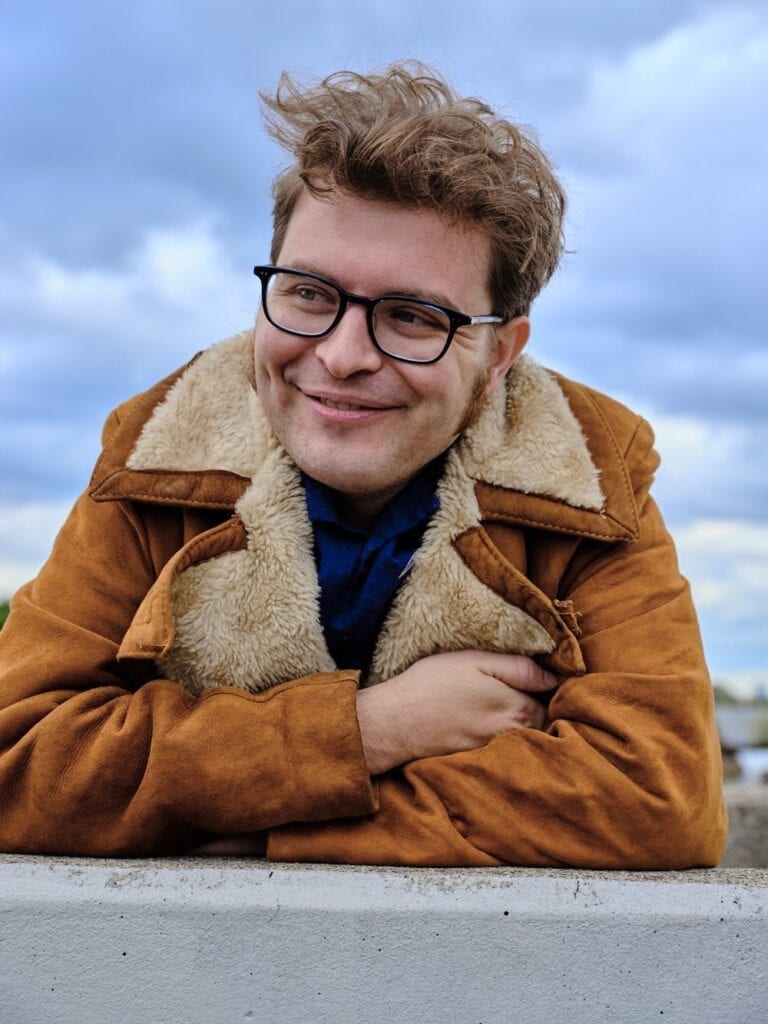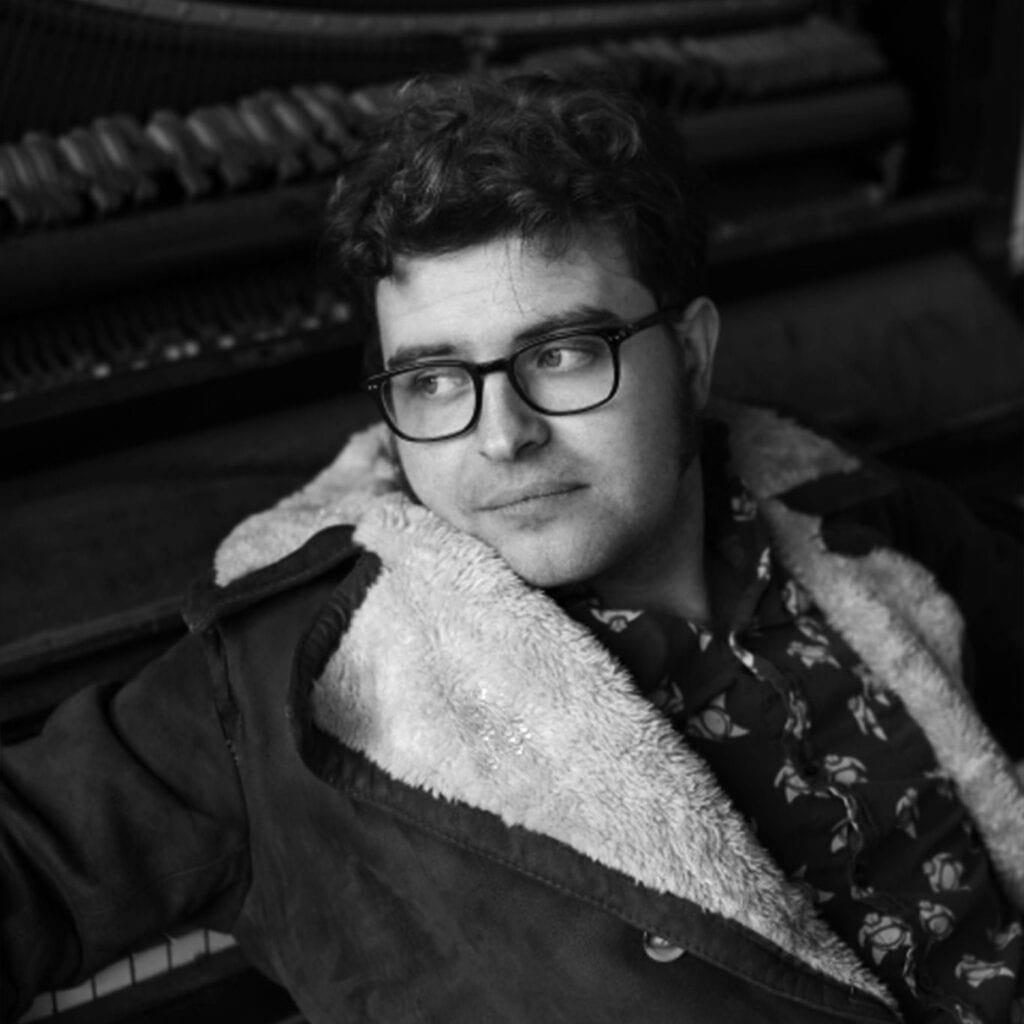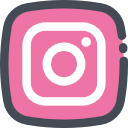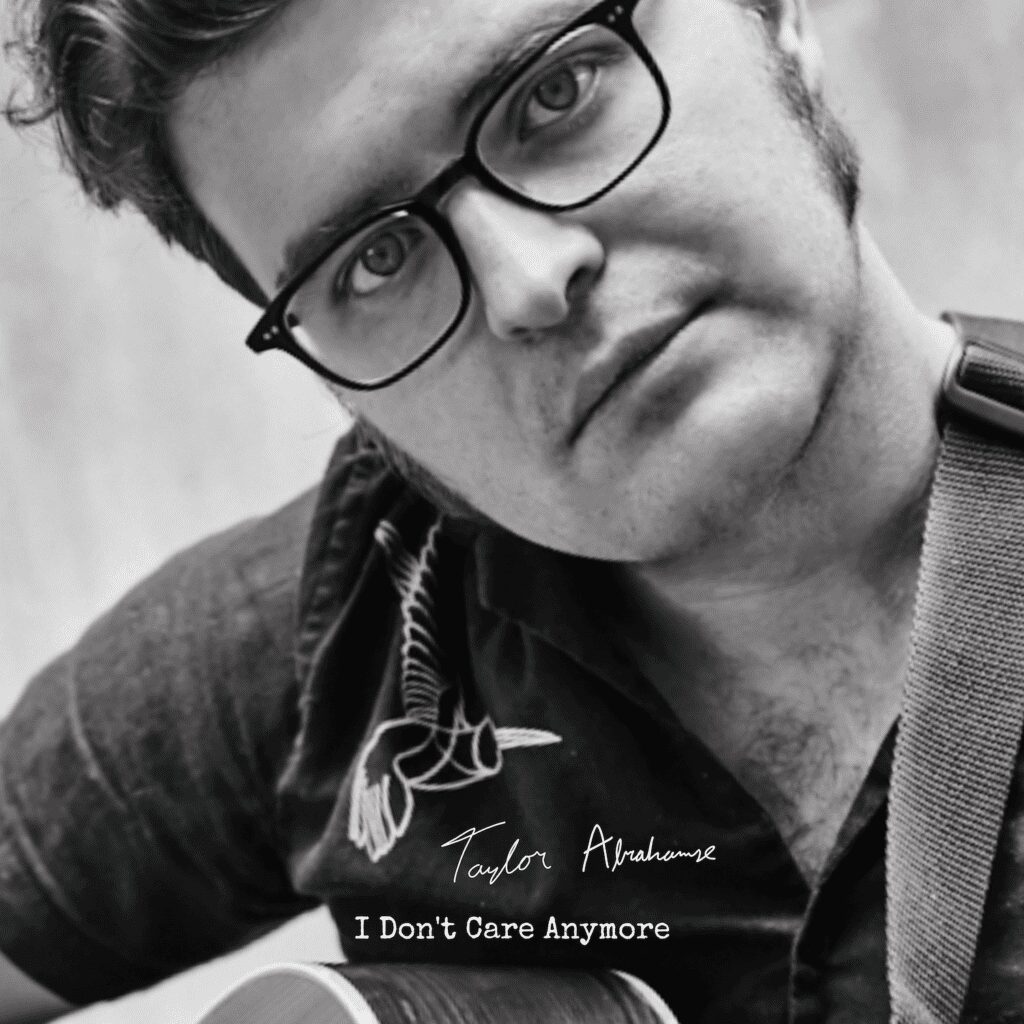Today our we shine our Spotlight – Taylor Abrahamse. We sit down with this talented artist coming off his recent collab with Eddie Kramer (Jimi Hendrix/The Beetles) to talk about the new single I Don’t Care Anymore. Check out the conversation below.
You got into show business at the age of 6 and songwriting shortly after. Do you feel like you were born to have a platform?
Born to do something in the arts, yes – but I’ve only been miserable when I’ve approached it like I was born to have a platform, because I quickly twist that into ‘born to be famous’, which is entitlement at its worst. Ultimately, I’m born to make a real difference with people through creative expression, which can take a lot of forms. Often the people who have a large reach aren’t really ‘reaching’ anyone, y’know? The ones making the biggest difference aren’t usually that easy to spot.
In your new album, you mentioned that the lyrics are personal, opening yourself up to issues about depression and gender identity. Why do you think it is important to talk about these issues? Are you glad that you are able to use your platform to potentially aid those with corresponding feelings?
I think the best thing music can do is talk about real, resonant things that are running around in the background that we haven’t quite put to words yet. That’s often what separates a good song from a great one. It’s depressing and dismaying how much of a lack of empathy there is in the human species – writing songs about complicated or taboo subjects, when done right, unifies and helps us understand each other – and ourselves. We start to realize ‘oh wow, that’s why they act how they do’, or ‘wow, I really miss that friend of mine’.
If someone found my music and the way I speak about the nuances of depression or gender identity spoke to them, they felt ‘finally, someone who isn’t talking down to me in broad strokes, someone who can help me really process this’ – that would be fantastic to me. I’d like to see more songs that try to unify and empathy rather than merely empower. “Empowerment anthems” can risk being a lazy & lucrative way to appeal to a demographic without doing the real work of helping divided people understand each other & create peace with each other. That doesn’t necessarily mean compromise either – it just means to understand each other.
With the vulnerability of this album, were there any songs that had you anxiously waiting for the reactions of the public?
I was particularly nervous about my gender identity song, ‘If I Was A Woman’. I was worried I was yet another white man talking where he wasn’t wanted. But showing it to the women in my life in my peer group, they all appreciated it and understood it. And Eddie Kramer insisted I record it. Even though I tried to bury the demo of it deep on a Soundcloud playlist and hide it from him. I was that mixed up about it.
However, now – it almost seems tame! Its trendy to write about these things & talk about them. I love how Gen Z is talking about literally everything now. Absolutely no filter, and its spreading all through Tiktok – my feed of it anyways. The problem now is having meaningful, life altering dialogue, rather than just getting indoctrinated with soundbites that oversimplify and commercialize important messaging. But we all know that’s going to keep happening till we talk about that enough too.
‘Woman’ is about my unique situation growing up
In small town Ontario in the early-mid 2000’s, where I felt deeply trapped by the limited language of masculinity at that time. Most male signs of affection seemed to mean you ‘must be gay’. As someone in the arts who isn’t gay, but loved gay artists and wanted to be a sensitive singer, it was very confusing and painful for me to be mislabeled. I was being slammed with all this transphobia & homophobia when I was neither of those things.
Also, I was called a ‘tranny’ on Canadian Idol forums when I was on that. I felt I didn’t belong anywhere in high school, even though I was at a place more liberally-minded. Part of me really felt my life would be better if I was a woman. That my high voice would make me make sense to others, that I would be able to express myself fully and be accepted – now, while I am down to present my feminine side on fuller display, I don’t put labels on whatever the heck I am.
Im Just Me
I’m not going to get a sex change or become hyper masculine so people can make better sense of me. Also, I’m cautious of the ‘wherever you go, there you are’ wisdom. Also that superficial changes don’t change what really counts – the mind & the spirit. It’s a huge can of worms to unpack in a 2 1/2 minute song. I love that I just leave it dangling… narratively as well as musically – it ends on a really out-of-the-key, haunting chord. Because it’s all a deeper conversation that is still being had.
We’ve been told about how women are raised to feel inferior to men. That song is about how, in a way, the opposite can be true as well. The problem as far as I can tell is toxic culture, not exclusively toxic masculinity or femininity, or any phobia or ism. Those are all side-effects of a toxic culture. Its culture inventing the idea of a ‘lack’ to fill people with so they’ll keep inventing levels of status, clubs & sects, and keep buying stuff and keep being productive – even when all this so-called productivity is irrelevant, harmful to the planet, and makes people avoid & struggle with being their natural selves.
The grass always looks greener on the other side until the heart & mind is willing to give up the idea of sides altogether and just find pleasure in being who they are, in this moment, now. Maybe. That’s what I’m wondering lately. It’s all part of a bigger discussion. I’d rather contribute to that than just wait for some magical day that I have all the answers. A lot of great sharing is avoided because people think they have to have all the answers before they open their mouths… say what’s there. Just don’t be a Morrisey about it either.
Your career has had a steady incline of national success all of which is more than well deserved. Is there a time you felt the imposter syndrome? If so, how do you cope with it?
How I cope is I just accept I am an imposter. We all are, and in some ways always will be, and I talk about it. That’s about as real as we can get in the present human condition, in a world that itself is an imposter on the natural world. If I don’t have any imposter syndrome, an ounce of healthy skepticism or curiosity about improving myself, you’ll know I’ve been replaced by a robot.
Great songs and great artists, I think, are willing to air their BS, and it helps people feel something real. It’s not always melodramatic, it’s not always flashy – but it cuts through (as much as its allowed) because its real. 9/10 dentists CAN be wrong. Just like a million people admiring an artist can be kind of wrong and just be doing it because enough ads have told them to.
Finding yourself
If you walk in with blind certainty, without any sense of imposter syndrome or any uncertainty with yourself, you are more likely to find early success. However you’ve also trapped yourself in a box, and when the world shifts around you and the identity you constructed no longer brings you joy but it’s what is expected of you, you’ll be in a very dark place. It will take admitting you have flaws, vulnerabilities, everything possibly falling apart, before anything new can emerge. As L. Cohen sang/said, ‘there is a crack in everything – that’s how the light gets in.’
Also – your life is always a work in progress, it doesn’t mean figure it all out before doing anything. In fact, there are many things that can only be discovered after certain thresholds of success are met. Long story short – we’re all imposters in one way or another, all unworthy in one way or another – Its ok! Be grateful, talk about it, and grow. I can’t use my white privilege to do any good if I’m busy beating myself up over it, but I can talk about it, and talk through my arrogance. Every conversation is a chance to engage in some form of therapy if you’re willing to have a spine.
Are there any major differences between your creative process as an actor and as a songwriter? Additionally, how many skills overlap between the two?
There are a lot of parallels – except I’ve seldom written my own dialogue, whereas I’m always writing my own songs. I’m leading a cartoon voice acting intensive on the weekends right now and I often approach the possibilities of voice acting in musical terms. We’re dealing with a lot of the same things, just not with staffs and 4/4 time. Pitch, dynamics, tempo, timbre – all figure heavily in both. And in both, you are, at best, telling a story that has highs, lows, and everything in-between. Something with variety that keeps the listener engaged.
I think in the future, a computer program will be able to convert movie scripts directly into songs. Much like how we can now kind of convert JPEG images into nonsensical audio files. How one interprets a song or a line in a cartoon show is just as fascinating as the song or the line itself. Its supremely joyful for me to listen to how say Sinatra, Blossom Dearie & Ella Fitzgerald interpreted the same song in vastly different ways that each make you feel something different.
Your new single “I don’t care anymore” is very mellow and serious. You exercised some of those acting talents in front of the camera. How did you stay downcast the whole time? What headspace do you put yourself in?
Ha! This proves my theory about a lot of closeup, on-camera acting: the music score does most of the work for the actors. I was honestly just super uncomfortable – the wind was awful that day, it was very cold – my hands were in the most pain they’ve ever been in while I was miming guitar playing, and there was some unprofessional behavior on set from people that complicated it further for us. Regardless, the pain you saw was just me doing my best to be present. I’ll take it as a compliment towards the song, and the editing – which was 99% my doing. Well placed shots to try and compliment the mood of each moment of the song – and I barely had enough footage I felt was useable.
Would you tell us about the music video production? Did you have a hand in choosing any outfits or hair in the piece? Specifically, were those awesome sideburns your idea?
The sideburns were my body’s idea, I merely trimmed them. I’ve been highly involved in all the videos coming out for this project. Partially as a cost-saving measure, also because I have that pesky thing called ‘vision’. Most of my videos look like they were made with 10-20K budgets, but it’s far from the case. And believe me, to really have all my visual ideas properly fulfilled, I would need a billion-dollar budget.
The experiment with this video is keeping it vague, rather than spelling out a message. Alternatively, the beats in the video for ‘I Won’t Put Up With It’ were carefully storyboarded out by me before filming. Even then, that video I over-storyboarded. We’re going to do a bunch of greenscreen ‘Sledgehammer’ Peter Gabriel style stuff that was just jarring whenever I added it in. We tried the opposite for this. Just a small list of shots we wanted. The hope was to film with patches of snow still around, but that didn’t pan out.
Building the Right team
I largely do all the editing & color correcting for all my videos, co-direct, produce for now. I would far prefer not to, but when I’ve tried the alternative, the results are often ‘meh’ to me. I’m not a prude though, I do find people whose work I like as well. I’m slowly finding the right team – it’s tricky. You need people who are willing to work with independent artist budgets, but skilled, reliable and ambitious. People willing to take a chance for the promise of bigger opportunities down the road. I don’t want people who let themselves get beat down by life and it’s just another day’s work to them. That doesn’t serve anyone.
The jacket is actually my Grandpa’s old jacket. We rushed to pick it up for some repairs right before the shoot. I also burn an old picture of him in the fire – I use the bridge to reflect on mortality.
Are you still actively acting or have you transitioned to the music industry? Which art do you feel is a truer expression of you?
I’m doing both – there are times I can get bitter and cynical about both, and be a real Morrisey about things. I’m gonna keep mentioning him, it’s fun! But in my heart of hearts, as long as I’m being generous with either of those gifts I have, I’m in a true expression of myself. Again, teaching this voice acting intensive, or co-writing with people in a way where I leave my ego at the door – always makes me feel like I’m in my element.
Being substantially influenced by the classics such as Elton John and Randy Newman, do you ever get the sense that you were “born in the wrong generation?” Is it a dream of yours to have stood among them in the 80s or do you feel grateful to have been raised on their music?
I’m grateful to have been raised on their music – it’s my job to find the new Randy’s and Elton’s of today to hang out with and hopefully lift up to that esteem with myself as time goes on. But yes, it would scratch something massive on my bucket list to at least meet them. And I have reached out to some major artists & people before and gotten more of a response than I expected, so anything is possible.
As for the industry, ugh – it’s so tempting to go on a book-long tirade but I also don’t want to be a Morrisey about it. Let’s look at it how my cynical, educated self does, first of all. You can skip if it’s just depressing to you, I wouldn’t blame you.
First way of looking at it: “I think the decay of music & songwriting started to reach a tipping point in the 80’s in general. ‘Thriller’ was such a monstrous critical & commercial success. It opened up a strange Pandora’s box, a height popular music never surpassed in its cultural effect. It was like Hiroshima, and the Bee Gees were Nagasaki. Their albums cracked a code in the human psyche. Now other artists & labels could use to exploit and manipulate emotions for profit, rather than to create as many things that were truly new & exciting and authentic with music. It pushed songwriting it into the realm of a cold, manipulative science. And people didn’t care, because the tools established by those albums were just that powerful. They were the basis of every boyband & every massive pop song from the then until today.
“Music is no longer this sacred acoustic phenomenon”
For most people where anything is possible. It’s a thing to put on when you want to feel a particular way, or a thing used to fill space so you can distract yourself from your deeper problems. As a 90’s kid looking on the early 70’s – that’s a time I wished I existed. Thoughtful young adults sitting on pillows listening to Jim Croche, Carole King & Janis Ian. People who have as much room to be crazy & young as they did to be reflective, and let themselves feel and let their music be hairier and messier. It seems like music has truly shifted in public consciousness into a commodity rather than a sacred thing. That is a tragedy that is hard to even notice or understand. It’s some black mirror, Orwellian stuff.”
Second way of looking at it
I’ll give you another that I was just told by my friend and platinum songwriter Terry Sawchuk. I’m paraphrasing, but: “If you’re telling yourself you were born in the wrong time, you’ve already doomed yourself in the music industry. You’re going to hate every second of it, and you may as well go back to University.” Life is a profound hellhole if you go through it as a victim to circumstance, so as tempting as view 1 is, the choice is clear, and every day I’m pulling myself out of view 1 and into reminding myself what a privilege it is to get to make music at all, and how progress is gradual – and can take surprising forms.
‘W.A.P’, is progress, even though on the surface it doesn’t sound like it. I love the idea of creating pop music. Whether for myself or others, to gradually transform the consciousness of humanity to one that is authentic, daring & thoughtful, and I think it’s possible. It’s all a matter of messaging. I think a lot of the artists at the top are also trying to use their privilege to do that as well. Demi Lovato’s new record, while musically very well-worn, takes on some wonderfully raw & unique subject matter.
“Bruno Mars is easing a new generation into nostalgic harmonic directions”
I’ve been noticing more adventurous chord progressions in pop the last six months or so. I think he helps that. Something of some kind is happening. Can it all start to feel like a black mirror episode? Yes, and it’s important to talk about the BS, but not to give up. Ultimately, the music that is out there is trying to respond to what the world wants. People often consume media out of fear or inadequacy, consuming stuff only to numb themselves. So then art is created that is made out of fear & inadequacy that merely numbs, and it’s a vicious circle. It’s perhaps just about us being careful about what we consume and upvote. Also people willing to go out on the skinny branches and be real in whatever they’re making.
What was the hardest song to record on the album and why?
They were all very demanding on me in one way or another, but I’d say ‘I Won’t Put Up With It’. Simply because it is such a densely packed piece of pop with so much going on. There are moments where there are fifty vocal harmony stacks. The album in general was an experiment with excess, which is a reckless thing to do with your first album, but I’m generally glad I did. I edited the whole bloody record and micromanaged & picked it apart a thousand times over. Cleaning up little noises, putting little noises back in where they took away humanity – re-taking guitars and vocals perpetually.
Some songs like ‘I Don’t Care Anymore’ I literally edited down from over 100 vocal takes for the final lead vocal. It’s absolute madness, and the luxury of having my own studio. And sometimes, my changes throughout all the songs made things better. Other times, I am just too close to it and it makes it worse, and Eddie is there to let me know that I had just wasted the last month trying to improve this or that.
Therefore, there’s a lot of work that went into them that you can’t even hear. More taking things away, while maintain this vision of a maddeningly dense, rich, ambitious album. It may take me five years before I can even tell if the mixing and mastering actually works or not. But people seem to love it. Very simply put, mixing got really complicated as it went since there were so many versions. Sometimes we had to build on trial mixes Eddie did because we couldn’t access his studio anymore, due to factors outside both of our hands.
You mentioned that you are a contrarian when it comes to music taste. Would you believe this to be true about your own music? What audience is your album addressed to?
I actually regret the word contrarian – that’s merely different for different’s sake. If I was truly contrarian, I wouldn’t follow any rules or guidelines of songwriting and my songs wouldn’t connect with people at all. I am ultimately a folk/pop songwriter, but I allow myself to be influenced by everything. The record is addressed to anyone who loves singer/songwriters – whether classic or contemporary.
“I’ve always been somewhere in-between”
Whether my voice, my gender fluidity. Heck – before I was born my Mom had a vivid dream where a deceased family member told her I would be a girl. And that didn’t happen – some cosmic signals got crossed somewhere, and I feel that was on purpose. I’m here to challenge the norms, but to not be a Morrisey about it. My whole life is some perplexing mix in the pursuit of something new – but it’s not to be deliberately obtuse. It’s just because that’s what I am.
PS. I think I’m bringing up Morrisey so much because I loved that new Simpsons episode where they poke fun at him. When a bloated parody of him walked on stage and slagged the audience, I actually felt ‘my God, that could be ME if I’m not careful’. It was a cautionary tale that hit me, that humbled me a bit.
This album funding is helped by the Toronto Arts Council. How was the process applying for the grant? Did they have any partnership with the album? Would you encourage the public to become involved with the council to support Ontarian artists such as yourself?
T.A.C are probably the most hands-off grand funding body for artists. Just ‘here’s some money, get it done by this day and send us a link’. I would highly recommend they apply for a T.A.C grant. Especially if they’re making their first project, or something a bit more atypical that would be otherwise hard to find funding for.
Are you going to stay at an Ontario based artist or do you have dreams of moving someday?
I love Canada – I always want to have some kind of place to stay here. I’m happiest in pure nature & solitude that Canada provides. However, I owe it to myself to really explore the world as well. Go to different places to try and reach a wider audience. We’ve got a tremendous amount of unreal talent here. It gets kind of stuck here, and I don’t quite know why. Maybe there’s a comfort and complacency that can set in once you get really good at writing arts grants.
Maybe Canadian artists are just too darn polite and nice and modest about their talent. It’s kind of sickening how modest some people are. To the point where they don’t own their own greatness. They hide away in Saskatchewan shacks and rob the world of their beauty. There’s also something that happens where if another country accepts you, then the country you’re from loves you twice as much. I do hope as time goes on, the bevvy of incredible Canadian talent we’ve kept to ourselves will get wider appreciation. If Billy Joel’s deep cut ‘Zanzibar’ can go viral on tiktok, anything is possible.
Your album is out. What lessons have you learned about songwriting, production, etc. that you will apply to your next album?
Simply put, I’m gonna set rigorous restrictions for myself. It must be done by X day, about X themes, using only X instruments. I thrive with the right kind of restrictions, as I’ve seen when I’ve written music for TV or other artists. I go a bit mad when I have a perfect storm of magical elements (legendary Grammy-winning producer, grant money, my own money, own studio). That’s when I put myself under the pressure to make a ‘masterpiece’ with no definition on what that really means.
Vague, grandiose visions mixed with a tendency to be very hard on myself, are a toxic cocktail. It basically made a feedback loop of nothing ever being good enough for me. I’ve always being able to invent a new problem with something. I had literally created a game with no rules, so I couldn’t win it. Alternatively, if I walk in with a very clear concept every step of the way and don’t dance outside those boundaries unless absolutely essential. I will get something done much faster & cheaper that I can probably be prouder of too.
What are you most excited to do again once the pandemic is over?
Experience human touch.
Finally, you mentioned in the RX interview you were like “a comedian that never quite made it”. What is your favorite joke you can tell us to send us off? Along with any ending notes.
I heard a lean, amazing one the other day that might not translate to written word, but we’ll see. ‘I love tell dad jokes…. he really seems to like them.’
As for an ending note, this is my experience in the music industry thus far. Quoting Roger Miller: ‘You can’t roller-skate in a Buffalo herd, but you can be happy if you’ve the mind to.’
Spotlight – Taylor Abrahamse is wrap. Big thanks to Taylor for taking the time with us
Check out I Dont Care Anymore right now!
Keep up with Taylor right here
Get your Spotlight right now – right here!
Send us a message







